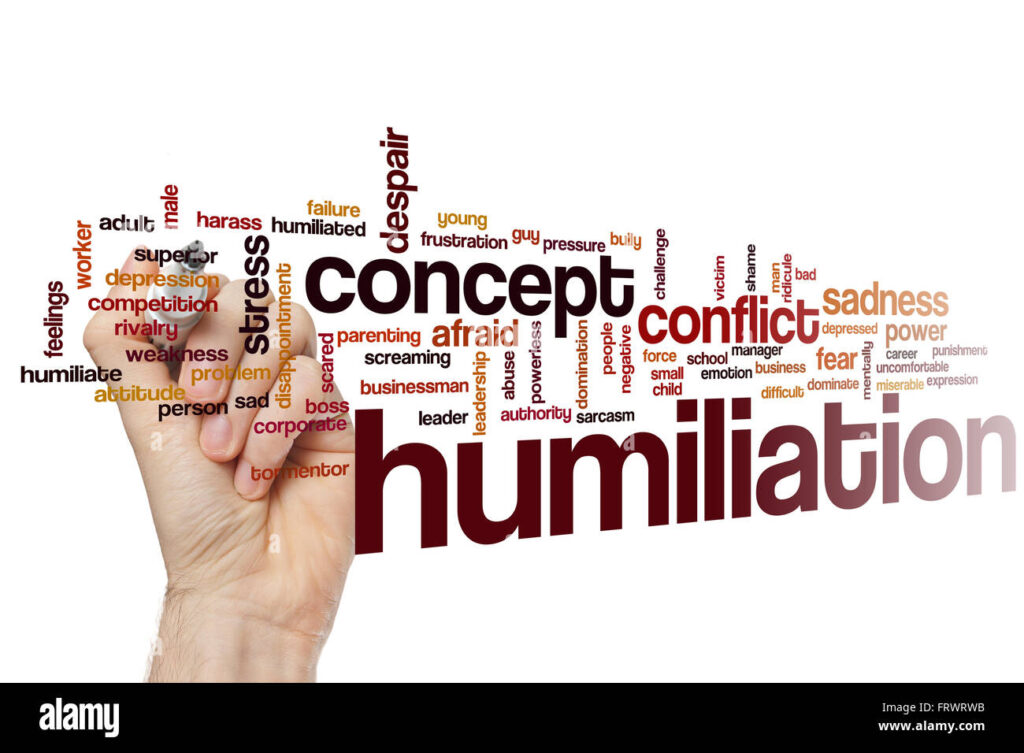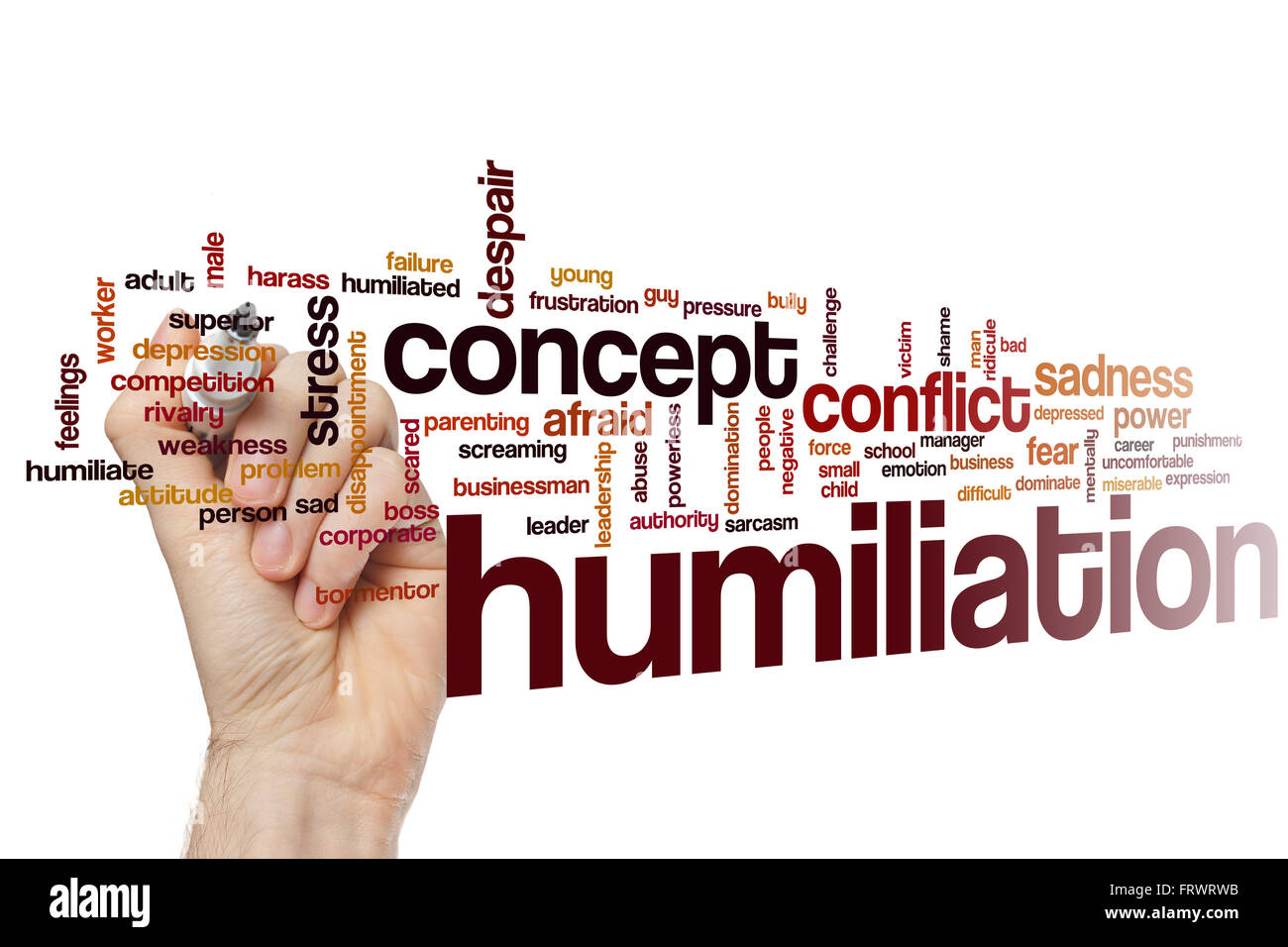
The Pervasive Impact of Humiliation: Understanding Its Roots, Effects, and Recovery
Humiliation, a deeply painful emotion, is more than just embarrassment. It’s a feeling of being debased, degraded, and stripped of one’s dignity. This article delves into the multifaceted nature of humiliation, exploring its origins, the psychological and social consequences it can inflict, and potential pathways to recovery. Understanding humiliation is crucial for fostering empathy, building resilience, and creating a more compassionate society. Recognizing the signs of humiliation in ourselves and others allows for timely intervention and support. The experience of humiliation can be profoundly isolating, but acknowledging its commonality can be the first step toward healing.
Defining Humiliation: More Than Just Embarrassment
While often used interchangeably, humiliation differs significantly from embarrassment. Embarrassment is typically a temporary feeling of awkwardness or self-consciousness arising from a social faux pas. Humiliation, on the other hand, strikes at the core of one’s self-worth. It involves a sense of being fundamentally flawed, exposed, and unworthy of respect. The intensity and duration of humiliation are often far greater than those of mere embarrassment. The act of being humiliated can leave lasting scars, impacting future behavior and relationships.
The Roots of Humiliation: Where Does It Come From?
Several factors can contribute to the experience of humiliation. These include:
- Public Shaming: Being publicly ridiculed or criticized can be intensely humiliating. The feeling of being exposed and judged by others amplifies the negative emotions.
- Power Imbalances: Humiliation often occurs in situations where there is a significant power differential, such as in abusive relationships or workplaces with bullying managers. The abuser uses humiliation as a tool to control and dominate the victim.
- Betrayal: Being betrayed by someone you trust can lead to feelings of humiliation, especially if the betrayal is public or involves a violation of deeply held values.
- Unmet Expectations: Failing to meet personal or societal expectations can also trigger feelings of humiliation, particularly if there is a strong emphasis on achievement or perfection.
- Social Exclusion: Being excluded from social groups or activities can be humiliating, especially if it is done intentionally or publicly.
The Psychological Impact of Humiliation
The psychological effects of humiliation can be devastating. Some of the common consequences include:
- Low Self-Esteem: Humiliation erodes self-worth and can lead to chronic feelings of inadequacy and self-doubt.
- Anxiety and Depression: The intense shame and negative self-perception associated with humiliation can contribute to anxiety disorders and depression.
- Anger and Resentment: Victims of humiliation may experience intense anger and resentment towards the person or situation that caused their pain.
- Social Withdrawal: Fear of further humiliation can lead individuals to withdraw from social interactions and isolate themselves.
- Post-Traumatic Stress Disorder (PTSD): In severe cases, humiliation can be a traumatic experience that leads to PTSD.
- Difficulty Trusting Others: Experiencing humiliation, especially through betrayal, can make it difficult to trust others and form close relationships.
The Social Consequences of Humiliation
Humiliation not only affects individuals but also has broader social consequences. It can contribute to:
- Increased Aggression: Individuals who have been humiliated may be more likely to engage in aggressive behavior as a way to regain a sense of control or power.
- Prejudice and Discrimination: Humiliation can be used as a tool to dehumanize and marginalize certain groups, leading to prejudice and discrimination. [See also: The Psychology of Prejudice]
- Political Instability: Widespread feelings of humiliation and resentment can contribute to social unrest and political instability.
- A Culture of Shame: Societies that rely heavily on shame and humiliation as forms of social control can create a toxic environment that stifles creativity and innovation.
Overcoming Humiliation: Pathways to Recovery
While the experience of humiliation can be deeply damaging, recovery is possible. Some strategies for overcoming humiliation include:
- Acknowledge and Validate Your Feelings: It’s important to acknowledge the pain and validate your feelings of humiliation. Don’t try to minimize or dismiss your experience.
- Challenge Negative Thoughts: Humiliation often leads to negative self-talk and distorted thinking. Challenge these thoughts and replace them with more realistic and compassionate ones.
- Seek Support: Talking to a therapist, counselor, or trusted friend can provide valuable support and perspective. [See also: Finding a Therapist]
- Practice Self-Compassion: Treat yourself with the same kindness and understanding you would offer to a friend who is struggling.
- Reframe the Experience: Try to reframe the humiliating experience in a way that allows you to learn and grow from it. What lessons can you take away from the situation?
- Set Boundaries: Establish clear boundaries to protect yourself from future humiliation. Learn to say no to requests that make you uncomfortable or that violate your values.
- Focus on Your Strengths: Remind yourself of your strengths and accomplishments. Focus on activities that make you feel confident and capable.
- Forgive Yourself and Others: Forgiveness, both of yourself and of others, can be a powerful tool for healing. However, forgiveness is a process, not an event, and it’s important to allow yourself time to grieve and process your emotions.
The Role of Empathy in Addressing Humiliation
Empathy plays a crucial role in preventing and addressing humiliation. By understanding and sharing the feelings of others, we can create a more compassionate and supportive environment. Empathy allows us to recognize the potential impact of our words and actions on others and to avoid behaviors that could be humiliating. Furthermore, empathy enables us to offer support and understanding to those who have experienced humiliation, helping them to heal and recover. Cultivating empathy is essential for building a society where everyone feels valued and respected.
Conclusion: Moving Beyond Humiliation
Humiliation is a pervasive and damaging emotion that can have profound consequences for individuals and society. By understanding its roots, effects, and potential pathways to recovery, we can begin to address this issue more effectively. Fostering empathy, challenging negative thought patterns, and seeking support are all crucial steps in overcoming humiliation and building a more compassionate and resilient world. Recognizing the signs of humiliation, both in ourselves and others, empowers us to intervene and offer the support needed for healing and growth. Ultimately, moving beyond humiliation requires a collective effort to create a culture of respect, understanding, and empathy.

